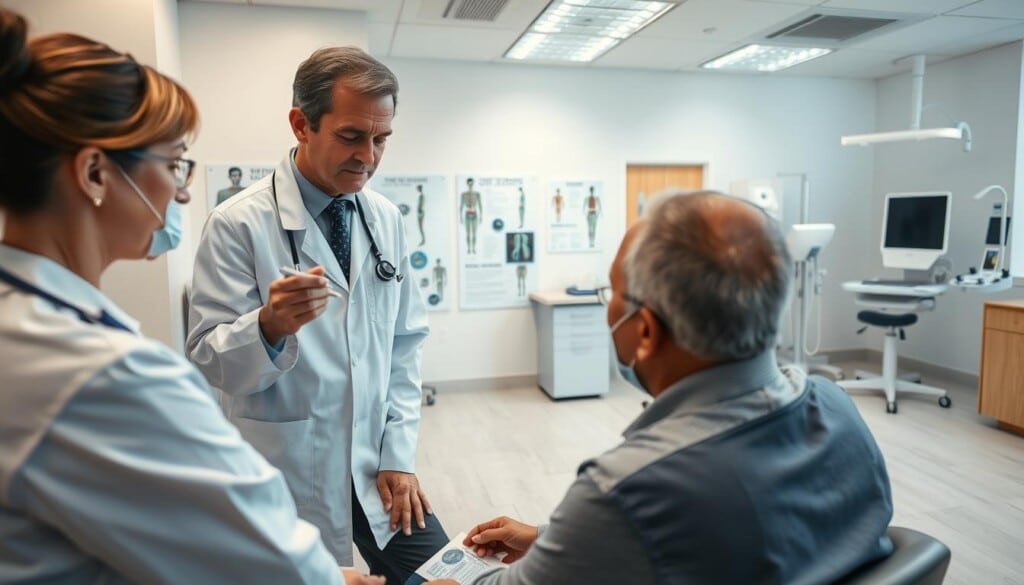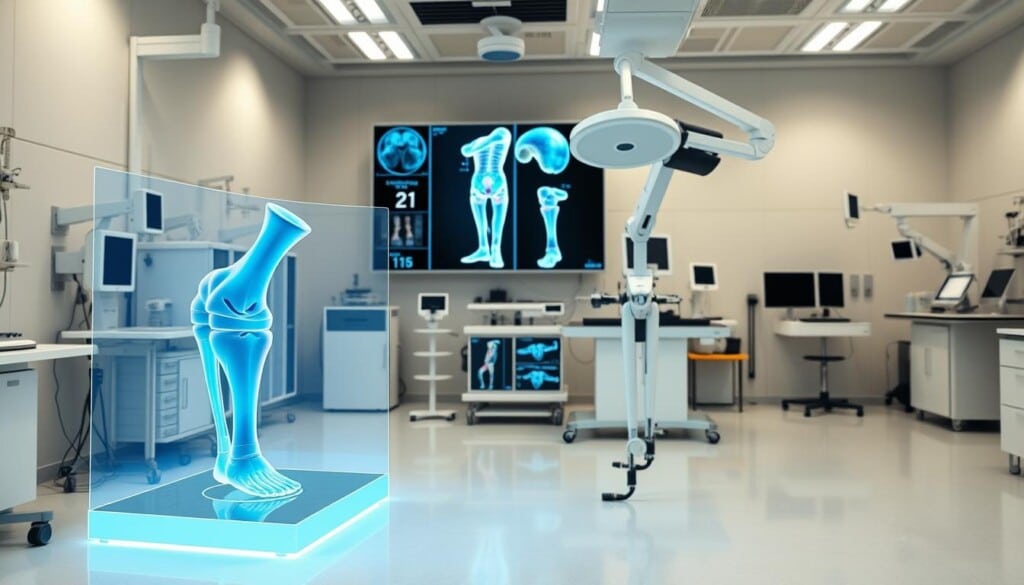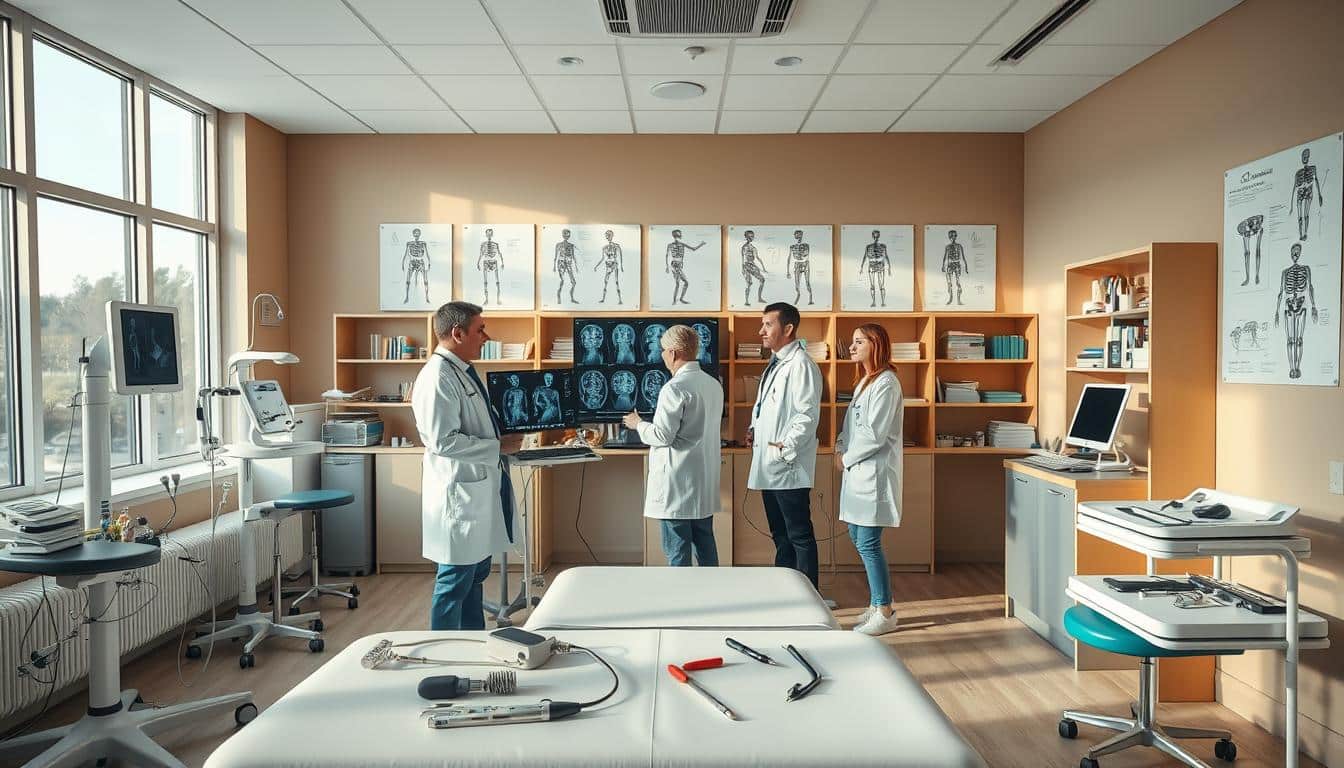Have you ever thought about how much your life quality depends on your joints and bones? Expert orthopedists are key in keeping your musculoskeletal system healthy. They diagnose, treat, and prevent problems in muscles, bones, and joints.
These specialists use both surgery and non-surgical methods. They handle everything from sports injuries to chronic pain. As orthopedics advances with new technologies, knowing about orthopedic care is vital for a better life.
Key Takeaways
- Orthopedists specialize in diagnosing and treating musculoskeletal disorders.
- Both surgical and non-surgical options are available for treatment.
- Timely intervention by orthopedic surgeons can lead to better health outcomes.
- Advancements in orthopedic techniques enhance patient care.
- Choosing the right orthopedic specialist is critical for personalized treatment.
Understanding the Role of Orthopedists
Orthopedic doctors are key in diagnosing and treating musculoskeletal conditions. They help people of all ages with joint pain and sports injuries. Their skills are vital for many health issues.
What Do Orthopedists Treat?
Orthopedic doctors focus on conditions like fractures, arthritis, and tendonitis. They also deal with injuries from sports or overuse. They look for the root cause of pain and dysfunction in the musculoskeletal system.
Common Conditions and Injuries
People often visit orthopedic doctors for sprains, strains, and tendon ruptures. Sports injuries can cause a lot of joint pain. Getting help quickly is important for recovery.
Non-Surgical vs. Surgical Treatments
Treatment plans vary based on the condition. Non-surgical options like pain meds, physical therapy, and bracing are often first. But, for severe injuries or complex fractures, surgery might be needed. It helps restore function and ease pain.
How to Choose the Right Orthopedist
Choosing the right orthopedist is key for your joint and bone health. Look at their qualifications, specialization, and what other patients say. A good orthopedic doctor has a Doctor of Medicine (MD) or Doctor of Osteopathic Medicine (DO) degree and has done a residency in orthopedics. Being board certified also shows they know their stuff.
Qualifications to Look For
Check the orthopedic specialist’s education and training. Knowing their qualifications can give you peace of mind. They’ve had a lot of training to handle many orthopedic problems. Find someone with the right training for your needs.
The Importance of Specialization
Orthopedic specialists focus on different areas, like sports injuries or joint replacements. Their specialization means they can give you better care. It’s important to find an orthopedist who knows about your specific issue.
Patient Reviews and Recommendations
What others say about an orthopedic specialist matters a lot. Patient feedback can tell you a lot about the care and satisfaction. Talking to other patients can help you decide which doctor is best for you.

Services Offered by Orthopedists
Orthopedists offer a wide range of services to help with musculoskeletal issues. They use diagnostic imaging like X-rays, MRI, and CT scans. These tools help them see the extent of injuries, which is key for treatment plans.
Diagnostic Imaging Techniques
Technology has greatly improved diagnostic imaging. X-rays show bone fractures quickly. MRI scans give detailed views of soft tissues and cartilage. CT scans combine both, giving a full view of complex areas.
These methods help orthopedists decide the best treatment for patients. This is very important for surgeries.
Physical Therapy Referrals
After diagnosing, orthopedists often send patients to physical therapy. This helps with recovery from injuries or surgery. Physical therapy strengthens muscles, improves mobility, and reduces pain.
Working together, orthopedists and physical therapists create a recovery plan. This plan is made just for the patient, improving their chances of a full recovery.
Joint Replacement Options
For those with severe joint pain, like from arthritis, joint replacements can be a game-changer. Orthopedists perform surgeries on knees, hips, and shoulders. These surgeries aim to restore function, reduce pain, and improve life quality.
Thanks to new techniques and materials, joint replacements are very successful. Many patients can go back to their daily activities with more energy.
Benefits of Visiting an Orthopedist
Seeing an orthopedist can greatly help if you have musculoskeletal issues. Getting help early can lead to many benefits. It helps in recovery and improves your overall health.
Early Diagnosis Advantages
Getting a diagnosis early means you can start treating joint pain and injuries quickly. Spotting problems early can stop them from getting worse. This way, you can start treatment sooner and avoid long-term damage.
Customized Treatment Plans
Orthopedic specialists create treatment plans that fit your needs and lifestyle. They consider your specific situation, so the treatment works well with your daily life. This makes the treatment more effective and comfortable for you.
Access to Advanced Technology
Orthopedists use the latest technology and treatments to help patients. They have access to top-notch diagnostic tools and surgical equipment. This means they can provide more precise and effective care, helping you recover faster.

LocalZ: Connecting You to Orthopedic Care
LocalZ is a key platform that connects people with local orthopedic care providers. It’s a local orthopedic directory that makes finding orthopedic specialists easy and accessible. With its user-friendly design, you can quickly find the right practitioner for your needs.
Overview of LocalZ Services
LocalZ offers a detailed list of orthopedic specialists, clinics, and services in your area. You can filter results by location and service type. This helps you find the perfect provider for your needs. It also strengthens local community ties and improves healthcare access.
How to Navigate the Directory
Using the LocalZ directory is easy. Just enter your location and the type of care you need. You’ll get a list of professionals tailored to you. Each profile has contact info, service details, and patient reviews. This makes choosing your orthopedic care simpler.
Finding Orthopedists in Your Area
LocalZ makes finding orthopedists fast and easy. You can explore local options and connect with practitioners in your community. This approach boosts the visibility of healthcare providers and builds trust among community members.
The Importance of Community Engagement
Community engagement makes the bond between locals and businesses stronger. LocalZ works hard to boost this connection. They focus on projects that bring everyone together, helping everyone win.
LocalZ’s Commitment to Local Businesses
LocalZ is all in for local businesses. They create a space where these businesses can grow. This helps businesses reach out to their customers, making them more visible and loyal.
This effort helps the local economy thrive. It’s all about building strong ties between businesses and their community.
Funding for Community Organizations
LocalZ gives half of what they make to community groups. This money is key for local projects. It helps these groups do their work better.
With this support, businesses can give back to the community. This creates a cycle of good deeds, benefiting everyone.
Building Relationships with Residents
LocalZ focuses on building real connections with locals. They work hard to understand what people need. This makes businesses better at serving their customers.
It also makes locals feel more at home. This shows how important community ties are for everyone involved.
What to Expect During Your First Visit
Going to your first orthopedic visit can be a bit daunting. But knowing what to expect can make it easier. The visit starts with a detailed look at your medical history, current symptoms, and lifestyle. This helps the orthopedist understand your situation better.
Initial Consultation Process
The first step is talking about your past injuries, any health issues, and how active you are. This is key to figuring out what’s wrong and how to fix it. Be ready to share your experiences fully. It helps the specialist make a better plan for you.
Typical Diagnostic Tests
After talking, the specialist might suggest some tests. These could be physical checks, checking how well you move, or imaging like X-rays or MRIs. These tests help confirm what’s wrong and what to do next.
Preparing Questions for Your Orthopedist
Good communication is important at your first visit. Think about questions you might have beforehand. This could be about your condition, treatment options, or what to expect during recovery. Asking these questions helps clear up any doubts and makes the visit more productive.
The Role of Technology in Orthopedic Care
Technology has changed orthopedic care a lot. It makes treatments better and helps patients more. Telehealth services are a big part of this change. They let patients talk to doctors from home, making it easier to get help.
Telehealth Services
Telehealth has made getting medical help easier. People don’t have to travel to see doctors anymore. This means they can get help faster and wait less for appointments.
Doctors use video calls to check on patients and talk about treatments. This way, they can give care quickly and efficiently.
Innovative Treatment Techniques
Orthopedic doctors use new tech to help patients. They use surgeries that are less invasive, which means patients heal faster. They also use new ways to help patients recover, making rehab better.
Patient Education and Resources
Teaching patients is key in orthopedic care. Technology helps doctors share info with patients. This helps patients understand their health better and make good choices.
Patients can learn a lot from digital resources. They can find more info by clicking here.

Understanding Orthopedic Surgery
Orthopedic surgery deals with many musculoskeletal problems. It uses different procedures for each issue. These include joint replacements, arthroscopy for small cuts, and repairs for fractures and tendons.
Types of Orthopedic Procedures
Many procedures help with pain and improve movement. Joint replacements are common for severe arthritis. Arthroscopy lets doctors fix joint issues with small cuts, leading to faster healing.
Fixing fractures means putting bones back in place. Tendon repairs help after injuries, making movement better.
Recovery Time and Rehabilitation
How long it takes to recover depends on the surgery. Joint replacements need more time than arthroscopy. Patients do physical therapy and exercises to get stronger.
Following the rehab plan is key for a good recovery. It helps avoid pain and discomfort.
Risks and Benefits of Surgery
It’s important to know the risks of orthopedic surgery. Complications like infections and blood clots can happen. But, surgery can also relieve pain and improve how you move.
Understanding both sides helps make informed choices. It sets clear expectations for what to expect after surgery.
Aftercare and Patient Support
Orthopedic aftercare is key to a good recovery after surgery or non-surgical treatments. It ensures patients get the right care to heal well. Talking to healthcare experts is very important during this time.
Importance of Follow-Up Care
Regular check-ups help orthopedists see how healing is going. They can fix any problems that come up. These visits are a big part of aftercare, helping patients get the right advice for their recovery.
Managing Pain and Rehabilitation
Managing pain is critical after orthopedic treatments to help recovery and improve movement. Exercises led by therapists help patients get stronger and more flexible. These plans are made just for each patient to help them heal best.
Resources for Recovery and Support
There are many resources to help patients recover. Educational materials teach about post-op care and rehab. Support groups let patients share their stories, creating a community that helps with the emotional side of healing.
Staying Informed about Orthopedic Health
Keeping your bones and joints healthy is key to living an active life. By taking steps to prevent problems and staying informed, you can lower your risk of musculoskeletal issues. Adding bone health tips to your daily routine is important for your long-term health.
Tips for Healthy Bones and Joints
Regular exercise, like activities that make your bones work harder, is essential. Eating a diet full of calcium and vitamin D helps keep your bones strong. Also, keeping a healthy weight and good posture can help avoid injuries.
Importance of Regular Check-ups
Seeing an orthopedic specialist regularly is important. It helps catch and track any joint or bone problems early. These visits give you the chance to learn about your health and take action. Being proactive with regular check-ups helps you stay healthy and manage risks.

